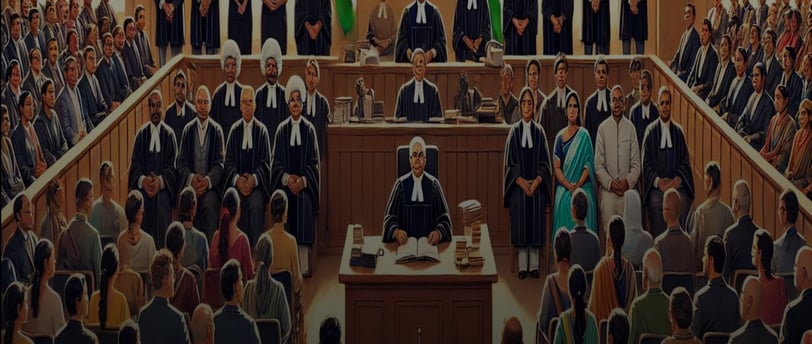Supreme Court Upholds Merit-Cum-Seniority in Jharkhand Judicial Promotions
Jharkhand Judicial Promotions Supreme Court Judgment in Civil Appeal No. 299 of 2025 On January 15, 2025, the Supreme Court of India delivered its judgment in the case of Dharmendra Kumar Singh & Others vs. The Hon’ble High Court of Jharkhand & Others, addressing the promotion of judicial officers in Jharkhand. The decision clarified the application of merit-cum-seniority and suitability tests in judicial promotions under the Jharkhand Superior Judicial Services (Recruitment, Appointment, and Conditions of Service) Rules, 2001. Background of the Case The appellants, senior judicial officers in Jharkhand, challenged their exclusion from promotions to District Judge posts despite clearing the suitability test. They argued that candidates with lower seniority but higher merit scores were promoted, contravening the merit-cum-seniority principle established for the 65% promotion quota.
1/19/20252 min read


The High Court of Jharkhand had dismissed their plea, upholding a notification dated May 30, 2019, which appointed private respondents to the posts. The appellants brought the matter before the Supreme Court, citing the unfair interpretation of promotion criteria.
Rules Governing the Case
The Jharkhand Superior Judicial Services Rules, 2001, outline the following:
Promotion Quotas:
65% based on merit-cum-seniority and passing a suitability test.
10% through a Limited Competitive Examination.
25% via direct recruitment from the Bar.
Suitability Test Criteria:
Minimum 40 marks to qualify.
Evaluation based on Annual Confidential Reports (ACRs), interviews, judgment writing, and seniority.
Promotion Principles:
Promotions in the 65% quota should prioritize merit-cum-seniority without creating a competitive merit list akin to the 10% quota.
Key Legal Arguments
The appellants cited the Supreme Court’s 2024 ruling in Ravikumar Dhansukhlal Maheta vs. High Court of Gujarat, which emphasized that suitability, not relative merit, governs the 65% promotional quota. The appellants argued that promotions should be granted to all candidates meeting the suitability threshold, regardless of comparative merit rankings.
The High Court of Jharkhand’s approach of prioritizing higher merit scores within the 65% quota effectively converted it into a competitive examination, violating the Rules.
Supreme Court Observations
The Supreme Court made the following key points:
Merit-Cum-Seniority Rule:
Promotions under the 65% quota should focus on determining whether a candidate is suitable based on their own merit and continued efficiency. Comparative merit lists are unnecessary and inconsistent with the principle.
Eligibility of the Appellants:
The appellants had cleared the suitability test, scoring more than the 40-mark threshold. Their exclusion due to lower rankings in a merit list was unjustified.
Precedents Cited:
In the Ravikumar Dhansukhlal Maheta case, the Court held that suitability assessments for the 65% quota should prioritize individual qualifications and avoid the competitive framework reserved for the 10% quota.
Directive for Uniformity:
The Court emphasized that merit-based promotions (10% quota) and merit-cum-seniority promotions (65% quota) must remain distinct to preserve fairness.
Final Decision
The Supreme Court allowed the appeal, setting aside the High Court of Jharkhand’s judgment. It ruled that:
The appellants are entitled to notional promotion from the date other candidates were promoted under the same notification (May 30, 2019).
They will receive all consequential service benefits, including seniority, increments, and notional pay fixation.
No back wages will be granted.
Implications
This ruling reinforces the distinctiveness of promotion criteria in judicial services, safeguarding the merit-cum-seniority principle in the 65% quota. It also highlights the importance of adhering to established rules and procedures to ensure fairness in public service promotions.
By addressing the grievances of excluded candidates, the Supreme Court has upheld the integrity of the judicial promotion system while ensuring that procedural errors do not undermine seniority rights.
